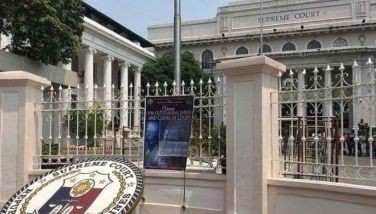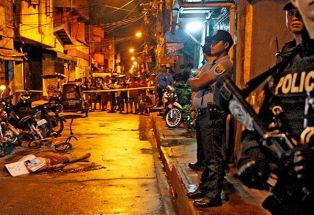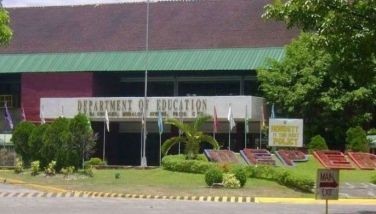Noy worsened poverty, debt burden – group
MANILA, Philippines - With each Filipino now having an estimated debt of P62,235.26, the group Freedom from Debt Coalition (FDC) has accused President Aquino of worsening the country’s poverty and debt burden during his administration.
“He turned out to be the biggest loan addict and a total failure in addressing the Philippines’ entrapment in a cycle of debt dependence,” Eduardo Tadem, president of FDC, said yesterday in a press conference.
FDC said Aquino has even surpassed former president Gloria Macapagal-Arroyo as the biggest borrower among Philippine leaders over a full term, from 1986 to present.
The group revealed that the current administration would leave its successor with P6.4 trillion of outstanding national government debt, P4.16 trillion of which are borrowings made during Aquino’s term.
FDC said that with the 103 million population, each Filipino now owes P62,235.26 plus P4,251 in government-guaranteed debts.
The group claimed that this unresolved debt problem has resulted in the government’s failure to meet its obligations to the people, or social debt as a percentage of the country’s gross domestic product (GDP).
FDC revealed that the President’s social debt in the sector of education and health alone amounts to P7 trillion.
“Philippine leaders since 1986 have merely continued this dependence on debt and non-prioritization of the welfare of the people because of blind adherence to prescriptions of country and multilateral lenders. It is time for us, the voters, to rise up and stage an electoral insurgency against debt and its role in perpetuating poverty and inequality,” the group said.
FDC announced that its call for electoral insurgency focuses on demands for the repeal of the automatic appropriations for debt servicing, repeal of the Electric Power Industry Reform Act, tax and fiscal justice to ensure priority government spending for the people’s needs and welfare, climate justice and housing and essential public services.
Walden Bello, an independent senatorial candidate, said that it is criminal that debt payments get the first cut in the national budget before appropriations are made for social and economic services.
“This vicious cycle of debt and ballooning social debt will continue as long as the government resorts to new borrowings to pay for old loans, including those tainted with fraud and corruption and with the existence of the law on automatic appropriations for debt servicing,” said Bello during the FDC press conference.
FDC said that from 1986 to 2015, or over a course of 30 years, the continued implementation of the policy on automatic appropriations for debt servicing has resulted in an average of 27.21 percent of annual public revenues automatically earmarked for interest payments, while principal amortization has eaten up an average of 67.61 percent of government’s new borrowings.
Tadem said one of the most cynical projections on how the Philippine economy will fare in 2016 was made by a Bank of the Philippine Islands economist who predicted that the country will grow by 6.2 percent “on the back of election spending,” particularly in the first half of the year.
“Election spending, of course, is merely a euphemism for massive vote buying, the improper and unethical use of government resources for the campaigns of pro-administration candidates, the splurging by big business and other vested interests of corporate and personal funds by donating to all candidates with a chance of winning, overspending by rich and propertied candidates and other supporters, funding the use of violence to increase chances of winning and many other counter-productive use of financial and other resources,” he said.
“These types of ‘election spending’ do not benefit the poor whose dismal and disempowered status is being used by traditional politicians and the ruling classes to advance the latter’s elite interests,” Tadem claimed.
The FDC, he explained, argues that the Philippine debt deserves closer scrutiny and critique. FDC reports that total national government debt as of December 2015 stood at P5.955 trillion, of which P3.884 trillion are domestic debts while P2.1 trillion are foreign obligations.
“In addition, the public sector debt was P7.434 trillion or 58.8 percent of the GDP. Public sector debt in 2014 was 13.17 percent higher than the 2010 figure, when Aquino took over as president. The Aquino III regime has actually become the biggest borrower among post-EDSA presidents with total borrowings of P4.24 trillion from 2010-2014,” he said.
Tadem said the outstanding debt of the national government under the Aquino administration has been growing at an average rate of 4.8 percent.
- Latest
- Trending





























